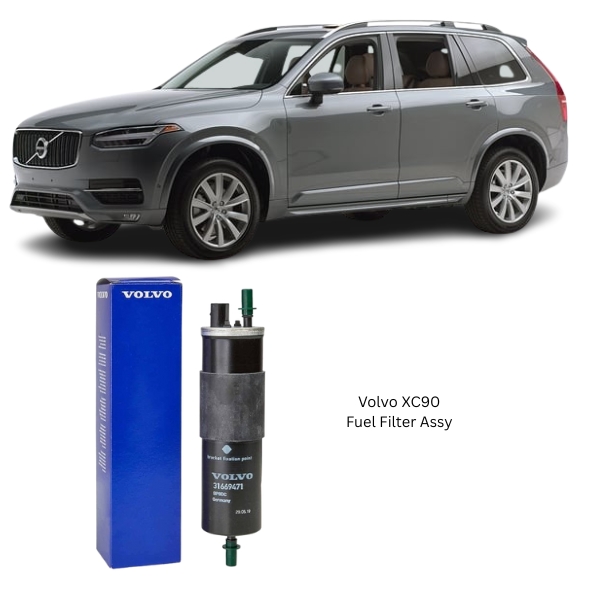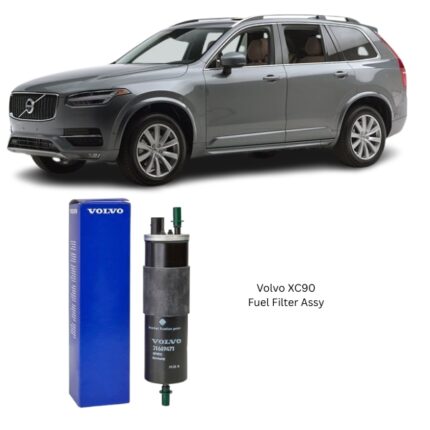Get Volvo XC90 Diesel Fuel Filter Assy 32312226 in Kenya
The Diesel Fuel Filter Assembly is a critical component in the fuel delivery system of a diesel-powered vehicle or machinery, designed to ensure that the fuel entering the engine is clean, free of harmful particles, and in optimal condition for combustion. Diesel engines rely on precise fuel injection and high-pressure systems to deliver performance, efficiency, and durability. Contaminated fuel can compromise these systems, leading to reduced performance, increased wear, and costly repairs. The diesel fuel filter assembly serves as a safeguard, capturing impurities before they reach the injectors or combustion chamber.
1. Purpose and Function
The primary role of the diesel fuel filter assembly is to remove contaminants from diesel fuel before it reaches the engine. Diesel fuel, unlike gasoline, is more prone to containing impurities such as dirt, rust particles, sludge, and water. These contaminants can originate from fuel storage tanks, transportation, refueling stations, or even condensation inside the vehicle’s own fuel tank.
Key functions include:
-
Filtering solid particles like dust, dirt, and rust that can damage injectors.
-
Separating water from diesel fuel to prevent corrosion and injector damage.
-
Maintaining optimal fuel pressure for consistent engine performance.
-
Protecting high-precision fuel system components in modern common-rail diesel engines.
2. Construction and Components
A diesel fuel filter assembly is more than just a paper filter element—it is an integrated unit designed to handle the demands of diesel fuel systems. While designs vary, most assemblies include the following parts:
-
Filter Housing – A durable outer casing, often made of high-strength plastic or metal, that protects the filter element and seals against leaks.
-
Filter Element – Usually made of specialized cellulose, synthetic fibers, or a combination, designed to trap particles as small as 2–10 microns.
-
Water Separator – Integrated into many diesel filters, it collects water at the bottom of the housing so it can be drained periodically.
-
Inlet and Outlet Ports – Allow fuel to flow through the assembly in a controlled manner.
-
Seals and O-Rings – Prevent fuel leaks and maintain pressure integrity.
-
Mounting Bracket – Used to secure the assembly in the engine bay.
-
Drain Valve – Found in filters with water separation capability, allowing water removal without disassembling the unit.
-
Sensor Ports – In modern systems, these can house water-in-fuel sensors or fuel temperature sensors for monitoring.
3. Types of Diesel Fuel Filter Assemblies
-
Primary Fuel Filters – Located between the fuel tank and the fuel pump, filtering large particles and water before the fuel reaches the secondary system.
-
Secondary Fuel Filters – Located closer to the engine, designed to catch finer particles before the fuel enters the injectors.
-
Spin-On Filters – Cartridge-type units that can be replaced entirely.
-
Cartridge Filters – Replaceable internal filter media that fit inside a reusable housing.
4. Filtration Process
The diesel fuel filtration process involves several stages:
-
Fuel Entry – Diesel fuel flows from the tank into the filter housing through the inlet port.
-
Particle Separation – The filter media traps solid contaminants.
-
Water Separation – In filters with a separator, water droplets, being heavier than diesel, settle at the bottom.
-
Clean Fuel Exit – The purified diesel exits the filter through the outlet port and proceeds to the high-pressure pump or injectors.
5. Importance in Modern Diesel Engines
Modern diesel engines, especially those with common-rail injection systems, operate under extremely high pressures—sometimes exceeding 2,000 bar (29,000 psi). At these pressures, even microscopic particles can cause severe injector wear or blockage. Additionally, the tight tolerances in fuel system components mean that water contamination can cause corrosion, reduce lubrication, and lead to injector failure.
The diesel fuel filter assembly plays an essential role in:
-
Ensuring consistent fuel atomization in the combustion chamber.
-
Preventing fuel system corrosion by removing water.
-
Extending injector and fuel pump life by preventing abrasive wear.
-
Maintaining engine efficiency and emissions compliance.
6. Water Separation and Drainage
One of the most significant differences between diesel and gasoline fuel filters is the water separation feature. Since diesel fuel can absorb moisture and water is heavier than diesel, the filter assembly often includes a water trap at the bottom.
Many assemblies have:
-
Manual drain valves for periodic removal of water.
-
Automatic drain systems in advanced setups.
-
Water-in-fuel sensors that trigger dashboard warning lights.
Neglecting to drain water can lead to:
-
Rust inside the filter and fuel system.
-
Poor combustion.
-
Freezing in cold weather, which blocks fuel flow.
7. Maintenance and Replacement Intervals
Diesel fuel filter assemblies require regular maintenance because they gradually become clogged with contaminants. A clogged filter can cause:
-
Reduced engine power.
-
Hard starting or stalling.
-
Increased fuel consumption.
-
Potential injector or pump damage.
Typical replacement intervals range from 10,000 km to 30,000 km, depending on manufacturer recommendations, fuel quality, and operating conditions. In areas with poor fuel quality, more frequent changes are advisable.
Signs your diesel fuel filter needs replacement:
-
Difficulty starting the engine.
-
Rough idling or misfiring.
-
Loss of acceleration power.
-
Check-engine light or fuel system warning light.
8. Installation Considerations
When installing or replacing a diesel fuel filter assembly:
-
Ensure the correct orientation (inlet vs outlet).
-
Prime the filter with clean diesel fuel or use a priming pump to avoid air locks.
-
Replace sealing O-rings and gaskets.
-
Avoid overtightening connections to prevent cracks or leaks.
9. Impact of Neglecting Filter Maintenance
Failure to maintain or replace the diesel fuel filter assembly can lead to:
-
Injector damage from abrasive particles.
-
Fuel pump failure due to lack of lubrication from contaminated fuel.
-
Poor combustion resulting in black smoke and higher emissions.
-
Engine overheating due to lean fuel mixture.
-
Complete breakdown in severe cases.
Given the high cost of diesel injectors and pumps, regular filter maintenance is far more economical than repairs.
10. Materials and Filtration Efficiency
Modern diesel fuel filters use multi-layer filter media:
-
Cellulose fibers for coarse filtration.
-
Synthetic fibers for fine filtration and water repellency.
-
Glass fibers for enhanced strength and durability.
The filtration efficiency is measured in microns—many diesel filters can capture particles as small as 2 microns, which is crucial for modern fuel systems.
11. Environmental Considerations
When replacing a diesel fuel filter assembly, proper disposal of the old unit is essential because:
-
It contains fuel residues harmful to the environment.
-
Some components may be recyclable.
-
Many workshops have fuel filter recycling programs.
Follow us on Facebook for more parts.





Reviews
Clear filtersThere are no reviews yet.